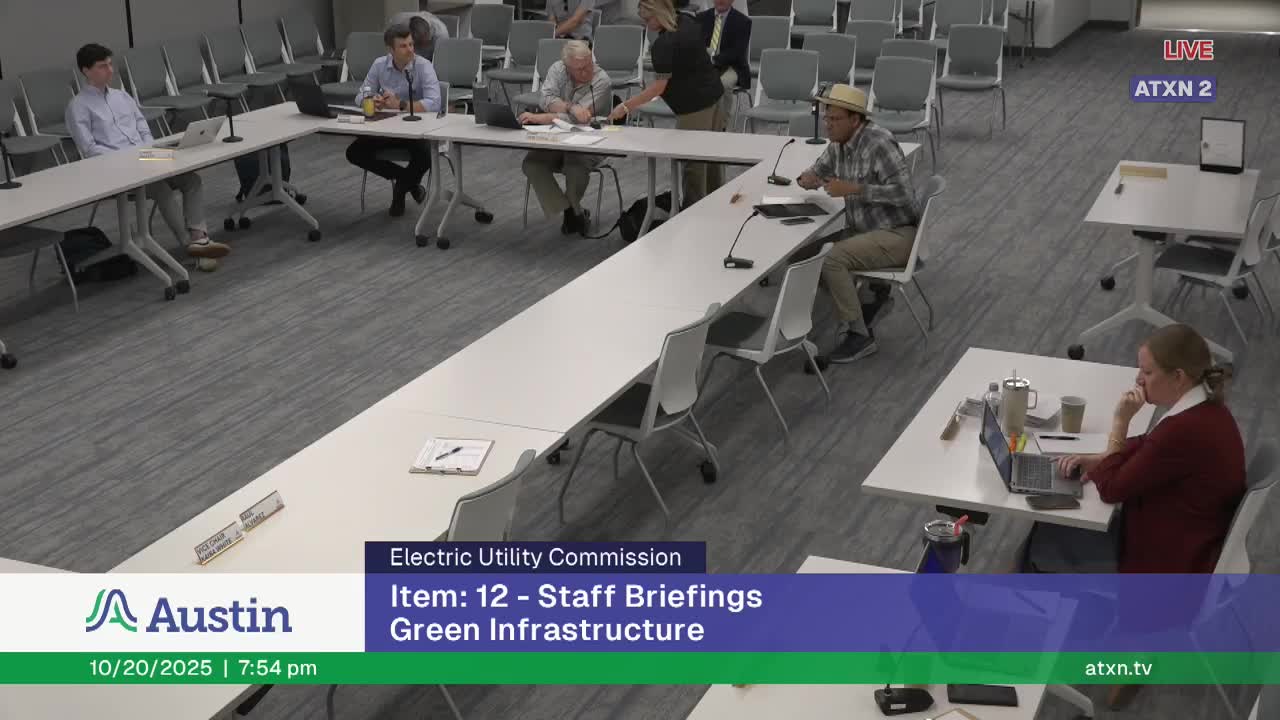Interdepartmental working group pushes 12 recommendations to make street trees standard in Austin rights of way
Get AI-powered insights, summaries, and transcripts
Subscribe
Summary
An interdepartmental Technical Advisory Review Panel (TARP) working group presented 12 recommended actions to reduce barriers to street‑tree planting and maintenance in Austin’s rights of way, including updates to city criteria manuals, standard plans, inventory work and options to replace burdensome private license agreements.
Austin transportation and public‑works staff briefed the Electric Utility Commission on Oct. 20 about a TARP (Technical Advisory Review Panel) working group’s 12 recommendations to improve green infrastructure, principally street trees, in city rights of way.
Michelle Marks of Austin Transportation described the work as the beginning of a multi‑department effort required by a 2024 council resolution. “The intent of this working group was to pull together kind of recommended actions for consideration by city leadership,” Marks said, adding that staff focused on street trees because of their outsized benefits for shade, stormwater absorption and walkability.
TARP’s recommendations fall into four clusters: regulatory updates, process improvements, maintenance structures and capital‑project alignment. Staff recommended starting with administrative criteria manual changes — updating the Transportation Criteria Manual (TCM) and Utility Criteria Manual (UCM) so sidewalk corridors, underground utilities and tree pit designs are aligned — and creating standard designs, specifications and 2‑D/3‑D guidance for soil volumes, irrigation and root‑barrier details.
On maintenance, the working group urged ending individualized private license agreements that now slow or block street tree installation and instead evaluate alternatives such as universal private‑maintenance expectations in code, municipal maintenance, or partnerships with nonprofits and “friends of” groups. The group also recommended a comprehensive street‑tree inventory to support proactive maintenance scheduling rather than complaint‑driven work.
Marks and her consultants told commissioners that the next step is interdepartmental coordination to scope criteria‑manual updates and that staff intend to send a memo to mayor and council summarizing recommended next steps. Commissioner questions focused on irrigation approaches, the possibility of conduit for future curbside electric‑vehicle charging while sidewalks are opened for tree pits, and coordination across Austin Energy, Austin Water, Austin Resource Recovery and development services.
Marks said irrigation is typically provided for newly planted street trees and that staff will bring curbside EV charging considerations into ongoing curb‑space planning. She emphasized that the present work is intended to remove interdepartmental conflicts that now prevent planting rather than impose immediate new requirements.
The commission did not vote on the report; staff said they will continue interdepartmental consultations and return with a proposed work plan for implementation and any resource implications.
Quotations are taken from the meeting transcript and attributed to speakers on the record.
